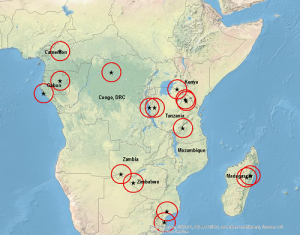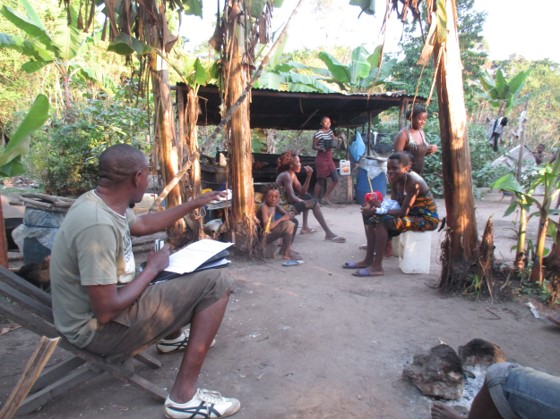Introduction
On October 26, 2017, the Africa Biodiversity Collaborative Group (ABCG) examined preliminary data on how climate change affects rural African communities and how their adaption responses impact biodiversity in its presentation titled, .
A major oversight of most climate assessments has been the inadequate consideration of indirect impacts on biodiversity due to changing human behavior in response to climate change (e.g. changes in human use of natural resources). ABCG’s thematic  working group, Managing Global Change Impacts on Biodiversity (GCI) is classifying human coping responses across Africa, and the impacts of these responses on biodiversity. Click here to view the GCI factsheet.
working group, Managing Global Change Impacts on Biodiversity (GCI) is classifying human coping responses across Africa, and the impacts of these responses on biodiversity. Click here to view the GCI factsheet.
The GCI working group members presented their progress to date in collecting data on human responses to climate change from 19 sites in Kenya, Zambia, Namibia, Madagascar, Tanzania, Uganda, Mozambique, the Democratic Republic of the Congo, Zimbabwe, Cameroon, and Gabon, and a preliminary analysis of the resulting effects on biodiversity. Results will be used to predict future responses to climate change in order to provide guidance on ecosystem based adaptation strategies.
The meeting commenced with opening remarks by Rebecca Goodman, ABCG’s Coordinator who provided a brief overview of ABCG’s approach and current activities. Nikhil Advani, Lead Specialist: Climate, Communities and Biodiversity at the World Wildlife Fund (WWF), then provided an overview of the project as a whole followed by a report from Chris Zganjar a conservation scientist at The Nature Conservancy (TNC) on activity progress across the 19 sites.
Activities
Key informant surveys were conducted at the 19 sites by ABCG members: TNC, WWF, the Jane Goodall Institute (JGI), the World Resources Institute (WRI), Conservation International (CI), the African Wildlife Foundation (AWF) and the Wildlife Conservation Society (WCS). Interviewers asked community members about their perceived changes in climate and 
CI is creating a typology of responses which transforms qualitative data from the interviews into quantitative data for use in mapping the occurrence of responses. So far, CI has analyzed 122 interviews (17% of total) with 630 responses to perceived changes in weather or climate.
34 unique responses have been identified where multiple responses are associated with decreased livestock productivity, crop productivity, and water availability. Responses primarily included adaptation strategies, such as migration and coping strategies, such as hunting.
Data collected from meteorological stations near pilot sites will determine whether interview responses are correlated with actual weather data. Assessing this data will indicate regions where people are likely to demonstrate varying (i.e., good and bad) coping strategies. Human response impact maps will then be overlaid onto maps of conservation priorities (e.g., national parks, species range, or ABCG partner project sites) to understand where human responses are most likely to impact conservation.
Overall recommendations from these activities for effective survey implementation/data collection:
- Simpler questions elicit more meaningful responses.
- Categorizing responses aids in determining trends and effects.
- Experienced interviewers decrease the time needed for interviews.
- Comparison of several climate models might lead to identification of areas where data is most significant.
- Comparing actual weather data with observed data sets provides a more accurate picture of possible climate trends.
Next Steps
The GCI working group will continue to review surveys and build a typology of responses. Climate maps will be prepared for all sites and responses associated with current climate trends. The GCI group will also identify locations where certain responses may happen in the future and identify alternate responses that should be encouraged.
WCS, TNC and CI will use the evidence base of human responses and likely conservation impact of response types to identify and prioritize adaptation strategies that improve biodiversity outcomes by helping people adapt to climate change. They will then develop and pilot a methodology to identify areas and prioritize adaptation efforts, including ecosystem-based adaptation, that accounts for potential trade-offs between targeting projects primarily to benefit to people and projects designed solely based on conservation objectives.
A final dissemination workshop will bring together varied stakeholders, including community representatives from the different survey sites, to present recommended adaptation strategies that are most likely to be successful for people while also benefiting biodiversity conservation efforts.
Resources
Click below to watch the event recording.
Click here to view the presentation slides.
For more information please contact, Nikhil Advani at nikhil.advani@wwfus.org
Photos
Photo 1 – ABCG survey sites. Photo Credit: Chris Zganjar, TNC
Photo 2 – Key informant interviews. Photo Credit: WCS


Add a Comment